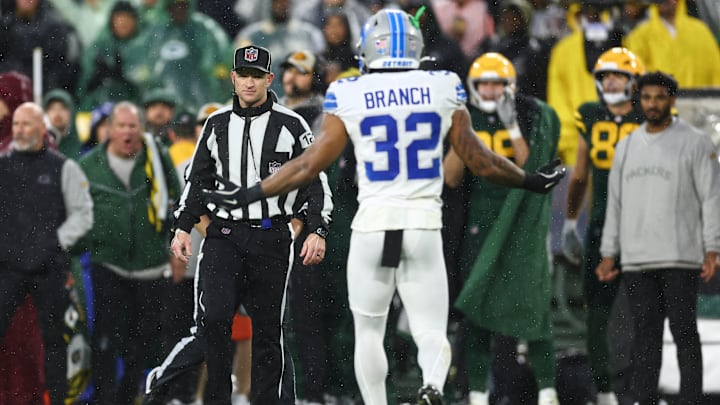In the second quarter of Sunday's win over the Green Bay Packers, Detroit Lions safety Brian Branch was penalized for a helmet-to-helmet hit on Packers wide receiver Bo Melton. Branch was ejected, and he drew an unsportsmanlike conduct penalty for his reaction to being ejected from the game.
The decision to eject Branch was questionable. and it came in consultation between the on-field officials and the league office in New York. Branch is also building a little history of helmet-to-helmet hits, two this season now, and he's sure to draw a fine for the sixth time in his career when fines for Week 9 come down. It's in line to be two separate fines, for the hit on Melton and his profane gesture afterward.
Senior Vice President of Officiating Perry Fewell, via the pool report after the game, confirmed that Branch's gesture could draw additional discipline.
A pool report on the Brian Branch ejection. pic.twitter.com/qEFRU2nEjb
— Justin Rogers | Detroit Football Network (@Justin_Rogers) November 4, 2024
There are always consistency issues with NFL officiating, with almost natural subjectivity brought by certain crews calling certain things differently/more than other crews. Branch's hit rising to the level of an ejection was taken out of the hands of the on-field officials.
Dan Campbell points to something else at play for Brian Branch's ejection
After the game, Lions head coach Dan Campbell was of course asked about Branch's ejection.
"Those guys did a great job, (referee) Clete (Blakeman) and them," Campbell said. "I got a lot of respect for what they do, but they just said it came from New York so that’s all I got on it. And that’s the first time I’ve ever been a part of something like that since I’ve been head coach, that somebody got ejected."
Campbell acknowledged he had not yet (at that point) seen the play, but also acknowledged that Branch will have to adjust his target to avoid penalties.
"Yeah, I have to see it. I don’t know. I’m assuming he hit his head. Certainly try to lower your target to where it doesn’t become that, but I never want to take away his aggressiveness and the skills that make him the player that he is, but it doesn’t help us when he isn’t available in the game either."
The Campbell suggested something that may draw the attention of the league office regarding the decision to eject Branch.
"He has to get used to that too when you play in primetime games", Campbell said. "New York is going to look at all these. They don’t care about the one o’clock games. They give us primetime games. So understand the situation and we will get through it. He will be fine.”
Campbell may have a point when he says "they don't care about the one o'clock games."
Earlier in the day on Sunday, Carolina Panthers safety Xavier Woods delivered a helmet-to-helmet hit on New Orleans Saints wide receiver Chris Olave. Woods only received a penalty, and he was not ejected. Olave went to the hospital after the hit. But that game, between teams that have a combined four wins this season, was seen by a far smaller audience than FOX's marquee game for the week in the late-afternoon window. For what it's worth, Melton was not injured on Branch's hit.
A bigger game, with more viewers and more attention on it, allows the league to send a not-so sneaky message about helmet-to-helmet hits if one happens. Branch's history may have played into his ejection too. But the primary difference in how two helmet-to-helmet hits were legislated on Sunday seems to be rooted in one game being far higher-profile than the other.
